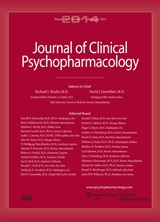 The Journal of Clinical Psychopharmacology has retracted a 2011 paper on depersonalization disorder by a pair of authors in Azerbaijan who got a bit too familiar with their source material without proper attribution. And the journal has offered its readers a handy — if depressingly obvious — admonition about publication ethics.
The Journal of Clinical Psychopharmacology has retracted a 2011 paper on depersonalization disorder by a pair of authors in Azerbaijan who got a bit too familiar with their source material without proper attribution. And the journal has offered its readers a handy — if depressingly obvious — admonition about publication ethics.
The article, “Lamotrigine in the immediate treatment of outpatients with depersonalization disorder without psychiatric comorbidity. Randomized, double-blind, placebo-controlled study,” by researchers at the Central Mental Clinic for Outpatients of Baku City, purported to find that:
OBJECTIVE:
Depersonalization disorders (DPDs) are highly prevalent in population. However, the effect of lamotrigine on outpatients with DPD without psychiatric comorbidity has not been studied in a double-blind placebo-controlled design.
METHOD:
Eighty patients (all men) were washed out from all medications. Each patient was randomized either to receive lamotrigine (40 patients) for 12 weeks or matched on placebo (40 patients) in a double-blind manner. Eligible participants, in addition to meeting the criteria for DPD from Diagnostic and Statistical Manual of Mental Disorders, 4th Edition, Text Revision, were required to be between 18 and 65 years. Response was defined as a 50% reduction in the Cambridge Depersonalization Scale. Response effects with lamotrigine and placebo were compared by using analysis of variance and χ² tests. Six patients did not return for at least 1 subsequent assessment, and 74 patients dropped out (36 taking lamotrigine and 38 taking placebo) in the valuables study group.
RESULTS:
Of the 36 lamotrigine-treated participants, 26 responded by 12 weeks versus 6 of the 38 placebo-treated participants (P < 0.001). The most common and problematic adverse effect in the lamotrigine group was rash.
CONCLUSIONS:
The authors believe this to be the first double-blind placebo-controlled randomization study to test the efficacy of lamotrigine in the management of outpatients with DPDs. These need to be replicated in a larger study group.
The paper has been cited four times, according to Thomson Scientific’s Web of Knowledge. It might be the first such study — but it wasn’t exactly an original. Here’s the notice:
The Editors-in-Chief, Journal of Clinical Psychopharmacology
It has come to our attention that an article by Aliyev and Aliyev 1 reproduces extensive wording from an article by Medford et al 2 without using quotation marks to identify that many of the words were not those of the authors who submitted the article to us.
On the basis of the guidelines of the Committee on Publication Ethics,3 this falls into the category of plagiarism. We have followed the Committee on Publication Ethics retraction guidelines when plagiarism of a published article is suspected.
As a consequence, we are retracting the following article:
Aliyev NA, Aliyev ZN. Lamotrigine in the immediate treatment of outpatients with depersonalization disorder without psychiatric comorbidity. Randomized, double-blind, placebo-controlled study. J Clin Psychopharmacol. 2011;31:61–65.1
We want to take this opportunity to alert our readers that it is not ethical to use a word-for-word paragraph or a series of sentences from the work of others without using quotation marks and citing the article quoted in the references. It is not sufficient to simply cite the primary article.
Richard I. Shader, MD
David J. Greenblatt, MD
The Editors-in-Chief
Journal of Clinical PsychopharmacologyREFERENCES
1. Aliyev NA, Aliyev ZN. Lamotrigine in the immediate treatment of outpatients with depersonalization disorder without psychiatric comorbidity. Randomized, double-blind, placebo-controlled study. J Clin Psychopharmacol. 2011; 31: 61–65. Ovid Full Text Bibliographic Links
2. . Medford N, Sierra M, Baker D, et al. Understanding and treating depersonalization disorder. Adv Psychiatr Treat. 2005; 11: 92–100.
3. Committee on Publication Ethics. Guidelines. Available at: http://publicationethics.org/resources/guidelines. Accessed January 3, 2014.
With respect to the last paragraph cited above, there may be an unintended message imparted to readers. Sure, “it is not ethical to use a word-for-word paragraph or a series of sentences from the work of others without using quotation marks and citing the article quoted in the references. It is not sufficient to simply cite the primary article”. But, including extensive quoted material from another source, even when done ethically by enclosing the text in quotation marks and providing a citation, is likely to be deemed as inappropriate. I suspect that any journal with minimum scholarly standards would reject the extensive use of others’ quoted text and require authors to provide an acceptable paraphrase/summary of the material.
washed out from all medications
Yeah, I used to feel like that too.